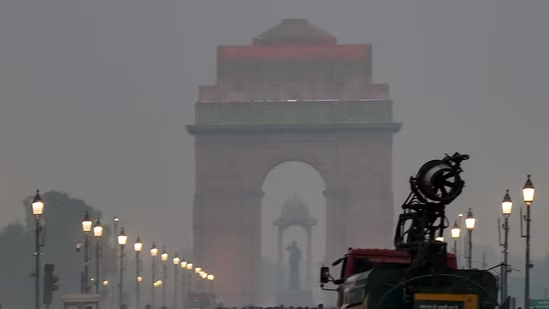GRAP-III Imposed: Delhi Tightens Pollution Curbs as AQI Crosses 400-Mark
Amid deteriorating air quality, authorities in Delhi have implemented Stage III of the Graded Response Action Plan (GRAP) with immediate effect on Tuesday. The move came after the Air Quality Index (AQI) of the national capital slipped into the ‘severe’ category for the first time this season.
According to data from the Central Pollution Control Board (CPCB), Delhi’s overall AQI rose sharply from 362 on Monday to 425 (as of 9 am Tuesday). The CPCB’s Sameer app showed that at 7 am, 34 of the city’s 39 monitoring stations recorded ‘severe’ pollution levels.
Among the most affected areas were Bawana (462), Wazirpur (460), and Mundka and Punjabi Bagh (452) — all recording dangerously high pollution readings.
The AQI scale classifies readings between 51–100 as ‘satisfactory’, 101–200 as ‘moderate’, 201–300 as ‘poor’, 301–400 as ‘very poor’, and anything above 400 as ‘severe’, posing health risks even for healthy individuals.
What GRAP-III Means for Delhi: Key Restrictions
With GRAP-III now in force, several stringent measures have been introduced to reduce emissions and curb dust pollution across Delhi-NCR.
Construction Ban:
All non-essential construction and demolition activities have been completely banned. This includes tasks such as earth excavation, piling, trenching for sewer or power lines, and the operation of Ready-Mix Concrete (RMC) batching plants.
Vehicle Restrictions:
All private BS-III petrol and BS-IV diesel four-wheelers are now banned in Delhi, Gurugram, Faridabad, Ghaziabad, and Noida.
The ban also applies to non-essential diesel-run BS-IV medium goods vehicles and BS-IV or lower light commercial vehicles registered outside Delhi, except those involved in essential goods transport or emergency services.
Work-from-Home Advisory:
Private offices have been urged to implement work-from-home or hybrid models to reduce traffic emissions.
School Closures:
Schools up to Class 5 have been asked to suspend in-person classes, with sessions shifting online until air quality improves.
Essential Projects Exempted:
Public infrastructure works considered essential — including railways, metro projects, airport construction, defence works, sanitation, and healthcare facilities — are exempt from the ban. However, authorities have directed strict adherence to dust suppression and waste management norms at all active sites.
Authorities are expected to review the situation in the coming days to determine if further escalation to GRAP-IV — the final emergency stage involving a complete ban on entry of trucks and halting of non-essential movements — will be necessary.
FAQs on GRAP-III and Delhi Pollution Curbs
1. What is GRAP-III?
GRAP-III (Stage 3 of the Graded Response Action Plan) is a pollution-control measure implemented when Delhi’s Air Quality Index (AQI) enters the ‘severe’ category. It involves strict restrictions on construction, vehicle use, and industrial activity to curb pollution levels.
2. Why was GRAP-III imposed in Delhi?
Authorities enforced GRAP-III after Delhi’s overall AQI rose above 400 for the first time this season, indicating ‘severe’ air pollution. The step aims to reduce emissions and prevent further deterioration of air quality.
3. What activities are banned under GRAP-III?
All non-essential construction and demolition activities are prohibited. This includes earthwork, road digging, piling, and the operation of Ready-Mix Concrete (RMC) plants.
4. Are vehicles affected by GRAP-III restrictions?
Yes. The use of BS-III petrol and BS-IV diesel four-wheelers is banned in Delhi, Gurugram, Faridabad, Ghaziabad, and Noida. Non-essential diesel-run commercial vehicles registered outside Delhi are also restricted.
5. Are schools closed due to GRAP-III?
Yes. Schools up to Class 5 have been asked to close temporarily, and classes are being conducted online until air quality improves.
6. Are government and public projects allowed to continue?
Yes, but only essential public projects such as railways, metro, airport, defence, sanitation, and healthcare are exempt from the ban. These must still follow dust and waste management rules strictly.
7. Will offices remain open during GRAP-III?
Private companies are advised to implement work-from-home or hybrid models to minimize vehicular emissions and reduce traffic congestion.
8. What happens if air quality worsens further?
If pollution levels continue to rise, the government may enforce GRAP-IV, the highest level of restrictions, which includes a complete ban on truck entry and halt of non-essential movements across Delhi-NCR.
9. How severe is Delhi’s current AQI?
As of Tuesday morning, Delhi’s AQI was recorded at 425, placing it firmly in the ‘severe’ category. Some areas like Bawana, Wazirpur, and Punjabi Bagh reported AQI levels above 450.
10. How can citizens protect themselves from pollution?
Residents are advised to stay indoors, use N95 masks when going outside, run air purifiers at home, and avoid strenuous outdoor activities during peak pollution hours.



